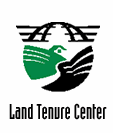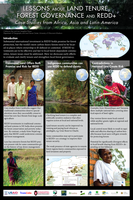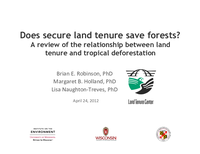Land Tenure Center

2012
Eco-bursaries as incentives for conservation around Arabuko-Sokoke Forest, Kenya
Incentives used to encourage local residents to support conservation range from integrated conservation and development Projects (ICDPs), which indirectly connect improved livelihoods with biodiversity protection, to direct payments for ecosystem services (PES). A unique hybrid between these two strategies, Arabuko-Sokoke Schools and Ecotourism Scheme (ASSETS), provides secondary-school bursaries to encourage stewardship of a biodiverse, highly imperiled Kenyan forest. Using household surveys and semi-structured interviews, we assess the effectiveness of ASSETS by comparing attitudes and perceptions toward the forest among scheme beneficiaries and non-beneficiaries.
Gobernanza de Bosques Y Redd+: Estudios de Caso del Ecuador
La tenencia de la tierra y los derechos de propiedad de los bosques son temas críticos para la nueva ola de instrumentos de política, basados en incentivos que tienen por objeto salvaguardar los bienes públicos que se encuentran en los bosques tropicales (como carbono, agua y biodiversidad), al valorar los bienes y los servicios que prestan y al pagar a las personas que los protegen (Bruce et al. 2010). El perfil más reciente y alto de estos instrumentos, REDD + (Reducción de Emisiones por Deforestación y Degradación), está atrayendo una inversión internacional importante.
Lessons on Land Tenure, Forest Governance and REDD+: Case Studies from Africa, Asia, and Latin America
This volume of case studies comprises one of two main publications resulting from the Oct. 21-22, 2011 Land Tenure and Forest Carbon Management Workshop hosted by the University of Wisconsin/Madison’s Land Tenure Center (LTC), Nelson Institute for Environmental Studies, and Geography Dept. Contributed by an impressive array of researchers, NGOs, and other development partners (Land Tenure Center, Wildlife Conservation Society, Landesa, CIFOR, Cordillera Tropical Fundación, Ecolex, PACT, Community Forestry International, World Resources Institute), this combination of national- and community level cases from Tanzania, Mozambique, Nepal, India, Cambodia, Laos, and Ecuador complement a set of research papers prepared simultaneously for a special issue of the journal World Development (2013). Featured in News: USAID RM Portal Featured Stories, Jan 10, 2012.
POSTER: Lessons About Land Tenure, Forest Governance And Redd+: Case Studies from Africa, Asia and Latin America
Substantial international investment in REDD holds promise for forest protection, but the world’s most carbon-heavy forests tend to be located in places where ownership is ill-defined or contested. If REDD investments are to be effective and fair to local forest-dependent communities, tenure issues must be addressed. Here we showcase early efforts to evaluate and clarify tenure and strengthen local forest governance.
Presentation: Does secure land tenure save forests? A review of the relationship between land tenure and tropical deforestation!
Presentation by Brian Robinson, Margaret Holland, and Lisa Naughton-Treves on the relationship between land tenure and tropical deforestation. For More Information: Brian E. Robinson, Institute on the Environment at the University of Minnesota, Lisa Naughton, Land Tenure Center, University of Wisconsin/Madison, Mike Colby, USAID
Does secure land tenure save forests? A review of the relationship between land tenure and tropical deforestation (CCAFS Working Paper No. 7)
Deforestation and degradation are tied to a complex array of socioeconomic and political factors. As noted in studies focusing on large-scale policy interventions such as REDD+ and payment for ecosystem services programs, among the most important of these factors is land tenure and land tenure security. This paper reviews past literature connecting forest outcomes and land tenure to better understand broad relationships between land tenure form, land tenure security and forest outcomes. From a theoretical perspective, clear and secure forest tenure can have either a positive or negative impact on forested land, depending on political and economic conditions. We review over 100 empirical cases of forest outcomes under specific land tenure conditions and find that land tenure security is associated with less deforestation, regardless of the form of tenure. State-owned protected forests are associated with more positive forest outcomes relative to private, communal and public land. We discuss consistency and identification issues in the current literature around deforestation and land tenure, and provide suggestions for future studies and implementation issues for policymakers. For more information contact: Brian E. Robinson, Institute on the Environment at the University of Minnesota (brobinson@umn.edu), Lisa Naughton, Land Tenure Center, University of Wisconsin/Madison (lnaughto@wisc.edu), or Mike Colby, USAID (mcolby@usaid.gov). Featured September, 2012.







